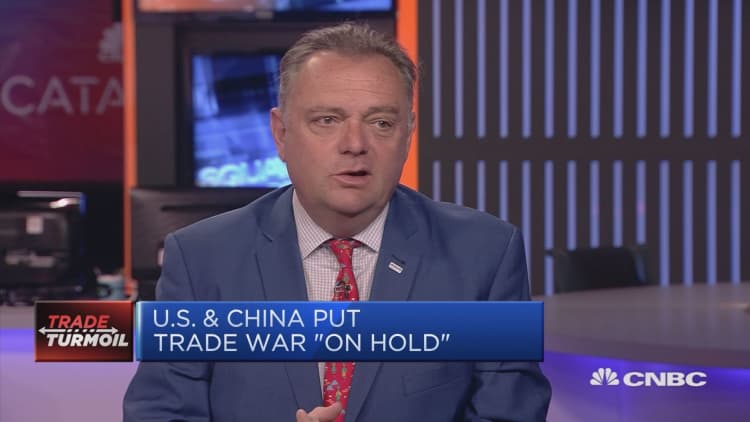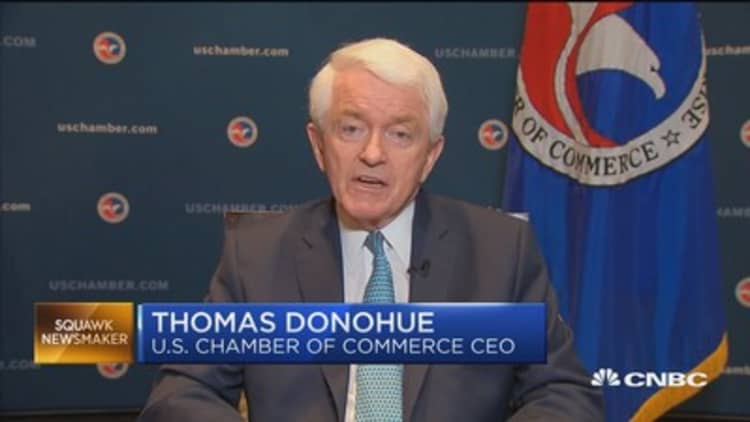
President Donald Trump likes to play the game big — big hotels, big deals and big promises of the things he wants to accomplish, both in his previous life as a real estate magnate and his current iteration as the head of state.
When it comes to trade, though, the president is in the uncomfortable position of having to play small ball, a baseball term referring to moving runners around the bases in a slow, deliberate manner instead of trying to hit the ball out of the park.
So it comes with his latest China trade endeavors, in which the president's hopes to obliterate a $375 billion trade deficit are proceeding not with grandiose game-changing home runs but with the equivalent of check-swing singles.
Trump scored a run this week with China's pledge to reduce tariffs on imported autos. But at this pace, it's going to be a long game, and even he conceded that he wants more from the talks.
"For President Trump, it's about the direction, it's about the message. He can say, 'Look, I'm making America great again,'" Neil Dwane, global strategist at Allianz, told CNBC. "But it's taken 20 years for America to get this trade deficit to this level. It's going to take them 10 or 20 years to redress it, even if they possibly can."
Indeed, the president's hopes to erase the deficit with China never had a chance of happening, and it's likely he knows that.
He wanted more out of the recent negotiations between an administration entourage and Chinese officials than the auto deal and a vague promise to import more American goods that did not come with the dollar figure the White House sought.
But criticism in some quarters that Trump caved to China's demands doesn't seem fair, just as expecting immediate results in the U.S.-China talks seems unrealistic.
"I think it's too early to cast aspersions on the administration. It is positive that there is less of a focus on tariffs and more of a focus on the broader trade relationship," said Dean Garfield, president of the Information Technology Industry Council, an advocacy organization monitoring the negotiations both in the U.S. and in China.
Tech has been a focal point of the talks. The U.S. is concerned about intellectual property theft and other issues, and tech firms want the ability to operate cloud computing, financial payment systems and other businesses in China without constraints.
Garfield said he's willing to be patient with the negotiations, but hopes to see tangible agreements in place before the end of the year.
"This is not something that's going to get hashed out in a couple of weekends," he said. "What we're talking about is driving structural changes to China's trade approach, which is a long-term endeavor."
Markets have generally responded positively to the pace of negotiations so far.
Stocks rallied strongly Monday, then tailed off a bit Tuesday as skepticism grew over whether Trump would hold a hard line and get significant concessions. There also are concerns with what approach the administration will take with Chinese telecom ZTE, which has faced stiff U.S. sanctions for multiple trade violations and has become a focal point in the trade talks.
Major averages were mixed around noon, but automakers were mostly positive — electric car maker Tesla was an exception — and semiconductors also rallied.
Paul Hickey of Bespoke Investment Group said the auto tariff news as well as the ZTE negotiations "are all positive developments suggesting that the two parties are working out deals to resolve their disputes."
Markets particularly liked Treasury Secretary Steven Mnuchin's comments over the past few days that a trade war has been averted, at least for now.
However, there remain fears that the peace may not last.
"We are quite concerned that this could be a temporary truce," Eli Lee, head of investment strategy at the Bank of Singapore, told CNBC. "At the end of the day, I think this issue could come back to the forefront."
WATCH: The Chamber of Commerce CEO talks trade.



